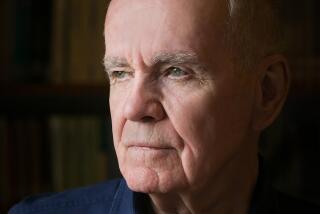The Side-Dishes of a Major Career : A COMMON ROOM Essays 1954-1987<i> by Reynolds Price (Atheneum: $23.95; 352 pp.) </i>
- Share via
A novelist and story writer of genuine distinction, Reynolds Price has ever been a realist, embracing Aristotle’s view that the artist’s job is to imitate life as he sees it. But Price has never been content, in his fiction, to present a narrow, personal view; he has always reached for the universals that account for our predicament. His novel “Kate Vaiden,” for instance, which won the National Book Critics Circle Award in 1986, was widely hailed for its astonishing mastery of a woman’s point of view--clear evidence of Price’s determination not to be restricted in his imagination by the accidents of biology.
Such scrupulous fidelity to nature, however, may leave the writer with a host of personal opinions that have not found expression in the disciplined ventriloquism of his fiction. Thus the need for such writing as are collected here: book reviews, opinion pieces, an after-dinner speech or two; opinions too strong for fictional garb, along with a letter of gentle encouragement to a young writer. Nearly 60 occasional pieces in all, ranging chronologically from an essay Price wrote as a college sophomore at Duke University to a matching statement of faith written after 30 years of teaching at his alma mater.
If a theme can be traced through these scattered side-dishes of a major career, it might best be termed Integrity --in at least six senses. First, in the sense of accuracy, of an honest accounting of reality. That undergraduate’s paper is anything but sophomoric in establishing the principles that hold sway throughout:
“Any work of art which I can call great must be found to exhibit characteristics:
1. It must be uncompromisingly faithful to truth and to the nature of things.
2. It must arouse pleasure for the aim of great art is to please.
3. It must exert an undiminishing attraction. Great art is not that which the sensitive man considers once. It is that to which he returns with deepening pleasure throughout his life.”
Integrity also means, in Price’s case, a commitment to revealing a deeper Truth--life’s essence of spiritual value. This concern for finding in every real or imagined situation what Saul Bellow has called “the nucleus of earnestness” keeps what may be true from turning trivial.
Wholeness is also implied by integrity, and this Reynolds Price pursues not only in his craftsman’s care for dramatic structure but in his efforts, in and out of fiction, to heal the schism of sex. The collector’s title itself comes from the late essay that frames Price’s vision of ideal androgyny:
“The gift lies not primarily in our sexuality but in something simpler and more complex--an early comprehension of the means of human life, packed as they are so lovably, transparently, delicately, frighteningly in bodies and minds called male and female but deeply kin. It’s in our power--writers and readers--to take the next step, back and forward, to a common gift: our mutual room.”
The integral view is also, fortunately for readers, a comic view; as Price observes parenthetically, “(My faith is that existence is--or will prove to have been--comic and that a serious writer can use any matter which he knows and needs to know, in which he imagines a whole design.)”
Integrity leads Price, finally, into an unchurchly but deep religiousness. The word religion means seeing the wholeness in things, after all: re- ligare, Latin’s “to bind together again.” This distinguishes it from the pro-fane, or setting apart.
The gender gap is not the only biological accident that Reynolds Price overcomes in his imagination. At age 54, he is a paraplegic in failing health, and has already outlived the doctors’ predictions. And yet, with fifteen books behind him, he is writing as never before. New poems and plays have preceded this volume; a new novel, “Good Hearts,” has been completed and will follow it. Whether as teacher, novelist, or memoirist-by-commission, Price enduringly nourishes our need for hope and our hope for truth.
More to Read
Sign up for our Book Club newsletter
Get the latest news, events and more from the Los Angeles Times Book Club, and help us get L.A. reading and talking.
You may occasionally receive promotional content from the Los Angeles Times.






